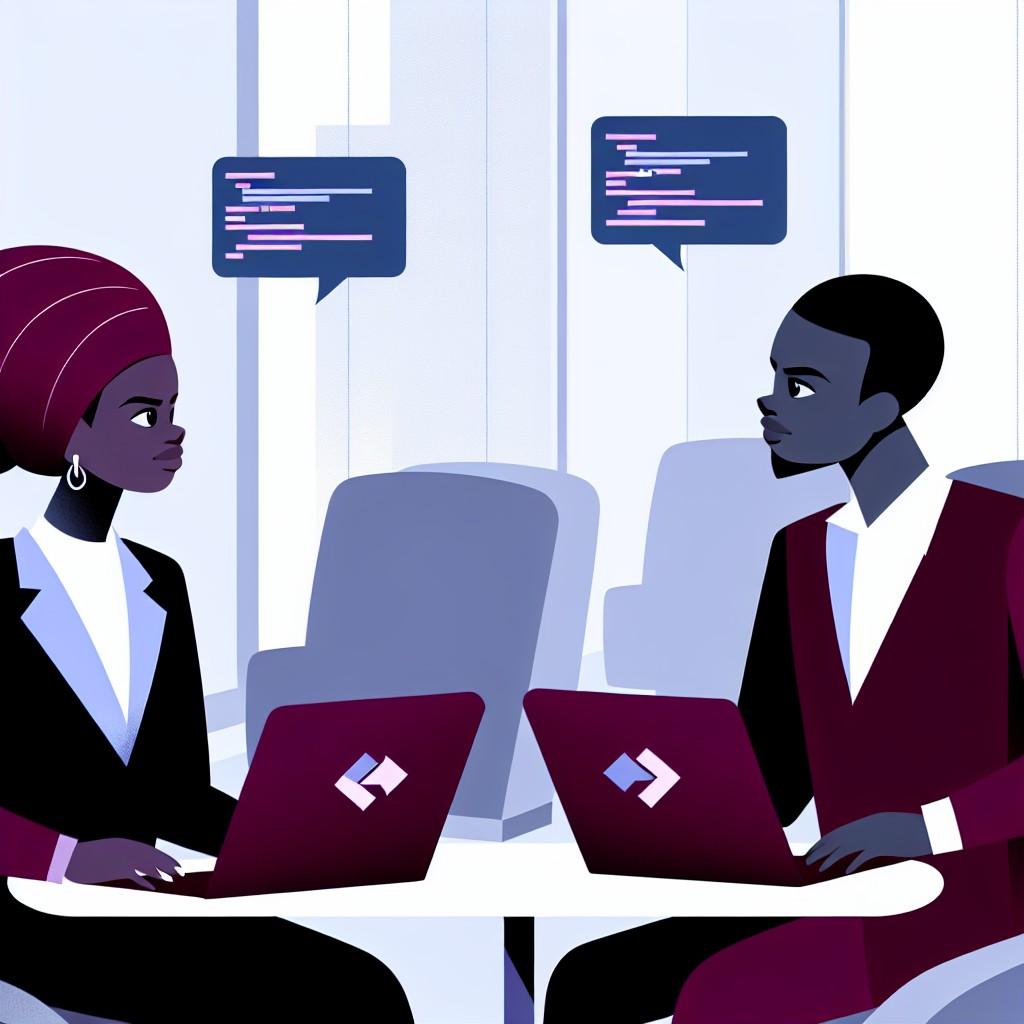Improving Problem-Solving Skills Through Diverse Coding Challenges
Exposure to Varied Problem Types
Online coding competitions present a wide range of problem types.
They include algorithmic puzzles, data structure challenges, and optimization tasks.
Consequently, participants enhance their adaptability and analytical thinking.
This diversity helps programmers like Maya Chen sharpen versatile problem-solving abilities.
Moreover, it pushes them to approach problems from multiple angles.
Developing Efficient and Creative Solutions
Participants learn to optimize their code for speed and memory usage.
This requirement drives innovative and efficient thinking.
For instance, software engineer Lucas Ramirez improved his coding style through competitions.
Additionally, it encourages breaking down complex problems into manageable parts.
Therefore, coders build both creativity and technical proficiency simultaneously.
Enhancing Logical Thinking and Debugging Skills
Coding contests demand precise logic and careful testing.
Gamers like Priya Nair refine their debugging strategies under time constraints.
This practice strengthens their ability to detect and fix errors quickly.
Besides, logical reasoning improves through frequent exposure to tricky problems.
As a result, participants gain confidence to tackle real-world programming challenges.
Unlock Your Unique Tech Path
Get expert tech consulting tailored just for you. Receive personalized advice and solutions within 1-3 business days.
Get StartedBuilding Consistency and Time Management
Regular participation fosters disciplined coding habits.
Contestants learn to solve problems within strict deadlines effectively.
For example, data analyst Kevin Brooks credits contests for improving his project timelines.
Thus, competitions help programmers manage pressure while maintaining accuracy.
This balance benefits their professional workflows dramatically.
Community Learning and Peer Inspiration
Coding contests connect programmers with global peer groups.
This environment promotes knowledge exchange and collaborative learning.
Talented developers like Aisha Patel stay motivated by sharing solutions and tips.
Moreover, exposure to diverse coding styles expands participants’ problem-solving toolkit.
Consequently, the community amplifies individual growth and skill improvement.
Enhancing Coding Speed and Efficiency Under Time Constraints
Developing Quick Problem-Solving Skills
Online coding competitions challenge programmers to solve problems rapidly.
Consequently, participants learn to analyze problems efficiently and prioritize tasks.
They train themselves to identify the core issues quickly to save time.
Also, this constant practice sharpens their ability to develop solutions under pressure.
Unlock Premium Source Code for Your Projects!
Accelerate your development with our expert-crafted, reusable source code. Perfect for e-commerce, blogs, and portfolios. Study, modify, and build like a pro. Exclusive to Nigeria Coding Academy!
Get CodeAs a result, coders improve their decision-making and resource management skills.
Mastering Time Management During Challenges
Competitors must allocate their time wisely to maximize their performance.
They learn to estimate the difficulty of each problem and plan accordingly.
This approach ensures they avoid spending too much time on any single question.
Additionally, participants practice pacing themselves for consistent progress throughout contests.
Effective time management reduces stress and enhances overall coding productivity.
Improving Code Writing Efficiency
Frequent participation accelerates developers’ ability to write clean and concise code.
They become familiar with common algorithms and patterns, creating solutions faster.
Moreover, they gain confidence in using shortcuts and libraries effectively.
This proficiency minimizes debugging time during time-sensitive environments.
Therefore, coders can deliver functional code under tight deadlines more reliably.
Building Mental Resilience and Focus
Coding competitions demand sustained concentration despite time constraints.
Participants develop strong mental resilience to stay calm under pressure.
This focus helps reduce careless errors and improve accuracy quickly.
Furthermore, it enhances their ability to handle unexpected difficulties during challenges.
Ultimately, this mental toughness benefits real-world programming scenarios requiring fast delivery.
Gaining Exposure to a Wide Range of Algorithms and Data Structures
Enhancing Problem-Solving Abilities
Online coding competitions challenge participants with diverse algorithmic problems.
They require quick thinking and applying varied data structures effectively.
As a result, competitors develop adaptable problem-solving skills.
Moreover, these contests expose coders to unfamiliar algorithms regularly.
This exposure helps improve their ability to tackle new challenges confidently.
Learning Through Practical Application
Coding competitions offer hands-on experience with complex data structures.
Participants implement algorithms to solve real-time problems under time constraints.
This practical approach deepens understanding beyond theoretical study.
Additionally, frequent practice sharpens coding efficiency and accuracy.
Consequently, competitors build strong foundations that benefit software development careers.
Diverse Algorithmic Concepts Encountered
Contests cover a broad spectrum of topics including sorting, searching, and graph theory.
They also involve dynamic programming, greedy methods, and advanced mathematical algorithms.
This diversity fosters a comprehensive algorithmic knowledge base.
Participants continually adapt to varying problem styles and complexities.
Such extensive learning expands their toolkit for future programming endeavors.
Exposure to Industry-Relevant Techniques
Many online competitions are sponsored by leading tech companies.
These events often reflect real-world algorithmic challenges faced in industry roles.
Thus, participants gain insights into practical problem-solving used by professionals.
Furthermore, this experience enhances their attractiveness to recruiters and hiring managers.
Networking opportunities at these contests also open doors to career advancements.
Structured Approach to Continuous Improvement
Regular participation creates a habit of systematic learning and growth.
Coders track their progress by solving increasingly difficult problems.
They receive feedback and learn optimal methods from community discussions.
This structured environment encourages steady improvement over time.
Consequently, competitors become well-versed in both basic and advanced algorithmic strategies.
Find Out More: The Top Coding Challenge Platforms for Nigerian Coders to Boost Skills
Building a Competitive Portfolio to Attract Potential Employers
Showcasing Problem-Solving Skills
Participating in online coding competitions improves your problem-solving abilities significantly.
You demonstrate critical thinking by tackling complex and diverse challenges under time constraints.
Consequently, you build a portfolio filled with real examples of effective algorithmic solutions.
Employers appreciate candidates who consistently solve difficult problems efficiently and accurately.
Highlighting Consistency and Commitment
Regular participation in competitions shows dedication to continuous learning and growth.
Moreover, it reflects your passion for coding beyond academic or professional requirements.
This commitment distinguishes you from other candidates in a competitive job market.
Therefore, maintaining an active presence in competitions strengthens your professional profile.
Demonstrating Adaptability and Learning Agility
Coding contests expose you to various programming languages and problem domains.
Thus, you quickly adapt to new tools and techniques required to succeed in challenges.
Employers value candidates who can learn rapidly and adjust to changing project needs.
As a result, your portfolio reveals practical experience with diverse programming environments.
Incorporating Achievements Strategically
Include your competition rankings and achievements in your resume and LinkedIn profile.
Also, provide links to your online profiles on platforms like CodeArena or DevSprint.
This transparency allows recruiters to verify your skills and commitment firsthand.
Furthermore, showcasing awards and certificates adds credibility to your technical expertise.
Highlighting Collaborative and Communication Skills
Many contests involve team competitions that develop collaboration abilities.
Participation in these events shows you can work effectively with peers under pressure.
You can also share experience communicating complex solutions clearly and concisely.
These interpersonal skills are essential for most software development roles.
Providing Practical Examples Through Projects
Use competition problems you solved as project examples within your portfolio.
Explain the approach, algorithms, and optimizations you applied to overcome challenges.
This practice illustrates your hands-on experience and deep understanding of concepts.
It also makes your portfolio more engaging and informative for hiring managers.
Gain More Insights: How Nigerian Coders Can Excel in Hackathons and Competitions
Networking Opportunities with Fellow Coders and Industry Professionals
Connecting with a Diverse Community
Online coding competitions attract participants from around the world.
Therefore, you meet coders with varied skills and backgrounds.
This diversity enriches your learning and broadens your perspectives.
Moreover, it helps you build friendships beyond geographical limits.
Engaging with Industry Experts
Many contests invite hiring managers and software engineers as judges or mentors.
Consequently, you gain direct access to experienced professionals.
Such interactions often lead to valuable career advice and mentorship.
Additionally, companies spot talented coders for internship and job opportunities.
Utilizing Online Platforms for Networking
Most competitions feature forums and chat rooms for participants.
Thus, you can collaborate and exchange ideas during and after contests.
Furthermore, platforms like CodeLink and DevHub facilitate sustained connections.
These communities often organize webinars and meetups to deepen relationships.
Advantages of Building a Professional Network
Establishing connections can open doors to collaborative projects.
Also, it helps you stay updated on industry trends and new technologies.
Besides, you gain access to exclusive job referrals and recommendations.
Ultimately, a strong network supports your long-term growth as a coder.
You Might Also Like: The Importance of Time Management in Solving Coding Challenges
Boosting Confidence and Motivation Through Achievement and Recognition
Sense of Achievement in Coding Challenges
Participating in online coding competitions provides a clear sense of achievement.
Each solved problem reflects your growing skills and dedication.
Consequently, this progress motivates continued learning and improvement.
Moreover, overcoming difficult challenges strengthens your problem-solving abilities.
Coders like Ethan Ramirez often share how challenges boosted their technical confidence.
Recognition from Peers and Industry Experts
Online competitions offer opportunities for recognition among peers.
This recognition validates your hard work and builds your professional reputation.
For instance, Sofia Alvarez gained visibility through top rankings on CodeGalaxy.
Additionally, many platforms feature leaderboards and achievement badges to showcase success.
This public acknowledgment encourages participants to maintain high standards.
Positive Impact on Career Growth
Winning or ranking well in contests attracts attention from tech recruiters.
Such recognition can lead to interviews and job offers from leading companies.
Developers like Liam Chen experienced career growth after strong competition performances.
Furthermore, achievements add substantial value to your resume or portfolio.
In this way, competitions help you stand out in a competitive job market.
Community Support and Encouragement
Engaging with competitive coding communities creates a support network.
Members often celebrate each other’s milestones and offer constructive feedback.
This camaraderie boosts motivation and keeps participants engaged over time.
For example, the Vertex Coders group regularly hosts virtual meetups to share success stories.
Thus, recognition extends beyond contests into ongoing peer encouragement.
You Might Also Like: How Coding Challenges Encourage Creative Problem-Solving Skills

Access to Global Coding Communities and Resources
Expanding Your Network Worldwide
Online coding competitions connect you with programmers from every continent.
These events foster collaboration and exchange of ideas beyond local limitations.
As a result, you build friendships and professional contacts with talented individuals globally.
Moreover, this exposure helps you understand diverse coding styles and problem-solving approaches.
Utilizing Rich Educational Resources
Many competitions provide extensive learning materials for participants.
These resources include tutorials, editorials, and detailed problem explanations.
Consequently, you can improve your skills even after the contest ends.
Additionally, platforms like CodeArena and ByteForge regularly update their libraries to reflect industry trends.
Engagement in Active Developer Communities
Joining coding contests grants access to active forums where programmers discuss strategies.
These discussions help you clarify doubts and gain new perspectives.
Furthermore, community members often organize workshops and webinars to enhance learning.
Participation in these activities deepens your understanding and motivation.
Opportunities for Collaboration and Mentoring
Global competitions often feature team events that encourage collaboration.
Working with peers strengthens communication and project management skills.
Experienced coders like Arjun Patel and Mei Lin frequently mentor newcomers in community sessions.
This guidance accelerates growth and builds confidence in complex challenges.
Access to Industry Connections and Career Growth
Top performers attract attention from renowned tech companies including NexaSoft and Orion Labs.
Recruiters use competition rankings to identify promising candidates.
Therefore, participation can open doors to internships and job offers worldwide.
Besides, you gain awareness of industry needs and cutting-edge technologies through company-sponsored contests.
Receiving Constructive Feedback and Learning from Mistakes
Importance of Constructive Feedback
Constructive feedback plays a vital role in improving coding skills.
It highlights areas that need further attention and development.
Moreover, feedback from experienced programmers guides participants effectively.
For example, Vanessa Harper from DevSprint emphasizes timely feedback’s value.
Therefore, engaging in online competitions exposes you to valuable critiques.
How Feedback Enhances Learning
Receiving precise feedback helps identify common coding errors quickly.
Consequently, this accelerates the process of mastering programming concepts.
Feedback also encourages thinking outside the box to solve problems efficiently.
Additionally, it cultivates a habit of reviewing and refining your code thoroughly.
Learning from Mistakes
Mistakes are inevitable during competitive programming challenges.
However, analyzing these mistakes is essential for growth.
For instance, Carlos Jimenez improved his algorithm skills by reviewing failed solutions carefully.
Reflecting on errors promotes deeper understanding and prevents repetition.
Strategies to Maximize Benefits
First, seek feedback actively from judges, peers, and mentors.
Second, maintain a personal error log to track recurring problems.
Also, discuss solutions with teammates or online communities to gain new insights.
Finally, implement suggested improvements in practice sessions for continuous progress.
Preparing Effectively for Technical Job Interviews
Understanding the Interview Format
Technical interviews often include coding challenges.
They also cover system design and problem-solving questions.
Understanding the format helps candidates focus on relevant areas.
Many companies like HorizonTech and Avelon prioritize algorithm questions.
Data structure questions are often included as well.
Reviewing common question types boosts confidence and performance.
Building Strong Problem-Solving Skills
Developing problem-solving abilities is crucial for technical interviews.
Participating in online coding competitions sharpens these skills under time constraints.
For example, Alicia Coleman improved her coding speed through weekly contests.
Practicing with platforms like CodeStream and ByteCraft simulates real interviews.
This experience helps candidates think critically and devise efficient solutions quickly.
Mastering Core Computer Science Concepts
Foundation knowledge in algorithms, data structures, and complexity analysis is essential.
Companies such as LambdaSoft and Nexa Systems emphasize these concepts during interviews.
Candidates should review topics like trees, graphs, and sorting algorithms diligently.
Understanding time and space complexity optimizes problem-solving approaches.
Utilizing Mock Interviews and Feedback
Mock interviews provide realistic practice and highlight areas needing improvement.
Connecting with mentors like Daniel Brooks offers personalized advice and criticism.
Many platforms offer peer-to-peer mock interviews simulating actual hiring processes.
Regular feedback helps refine communication skills and technical explanations effectively.
Creating a Consistent Study Schedule
Consistency in preparation maximizes retention and skill development over time.
Setting daily or weekly goals keeps candidates motivated and on track.
For instance, Rachel Nguyen allocates two hours daily to solving coding problems.
Balancing practice with rest prevents burnout and sustains progress.
Exploring Relevant Resources and Tools
Using diverse resources enriches understanding and exposes candidates to various problems.
Resources like “Algorithmic Pathways” by Martin Chen provide in-depth topic coverage.
Interactive platforms such as CodeCrate and DevPulse offer hands-on coding experience.
Additionally, reviewing company-specific interview experiences guides targeted preparation.
Maintaining a Positive Mindset and Confidence
Confidence greatly influences interview performance and problem-solving abilities.
Engaging in coding competitions builds both technical skills and self-assurance.
Prior successes in contests like TechSprint often translate to better interview outcomes.
Candidates should celebrate small wins and maintain a growth mindset throughout preparation.
Encouraging Continuous Learning and Skill Advancement
Fostering a Growth Mindset
Online coding competitions inspire participants to adopt a growth mindset.
They push developers like Elena Martinez to embrace challenges confidently.
Moreover, competitors learn to view mistakes as opportunities for improvement.
This perspective enhances problem-solving skills and resilience over time.
Keeping Up with Emerging Technologies
These competitions often feature tasks involving the latest programming languages and tools.
As a result, coders such as Rohan Patel stay current with industry trends effectively.
Consequently, they develop expertise that benefits their professional careers.
Additionally, many contests incorporate new algorithms and frameworks regularly.
Structured Learning Through Competitive Problems
Participants encounter diverse problems that demand creative and analytical thinking.
For example, Sophia Lin found that practice in contests improved her data structures knowledge.
Competitions provide a clear progression path from simple to advanced challenges.
Thus, competitors refine specific skills consistently and systematically.
Building a Supportive Learning Community
Coding contests encourage interaction with peers and mentors worldwide.
Developers like Marcus Lee exchange insights in forums and discussion groups regularly.
This collaboration motivates continuous learning and fosters skill sharing.
Furthermore, feedback from experienced coders helps accelerate growth significantly.
Tracking Progress and Celebrating Achievements
Many platforms rank participants, helping them monitor their improvement regularly.
For instance, Anika Rao set personal goals based on her contest rankings over time.
Recognition through badges, titles, and leaderboards increases motivation.
Therefore, coders remain committed to advancing their skills persistently.




